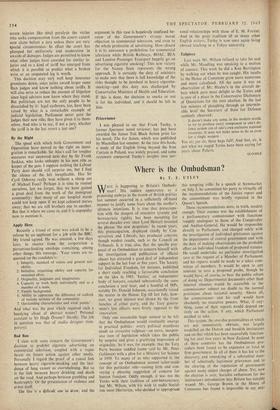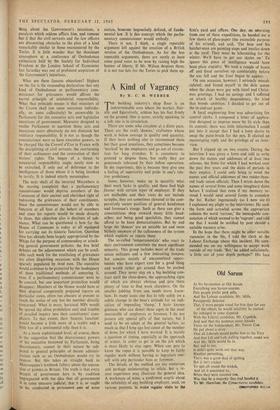Where is the Ombudsman?
By T. E UTLEY
WRAT is happening to Britain's Ombuds- man? His sudden appearance as a promising embryo in the womb of British politics last summer occurred in .a sufficiently off-hand manner to justify some fears about the mother's ultimate intentions. It is true that preoccupa- tion with the dangers of executive tyranny and bureaucratic rigidity has been mounting for several decades ever since Lord Hewart invented the phrase 'the new despotism.' In recent years, this preoccupation, displayed chiefly by Con- servatives and Liberals, has produced concrete though modest results, such as the Council on Tribunals. It is true, also, that the specific pro- posal of an Ombudsman to concern himself with the investigation and publication of official abuses has attracted a good deal of independent support in the last four or five years. The Society for Individual Freedom, for instance, published a short study reaching a favourable conclusion on the idea in 1961; 'Justice,' an independent body of lawyers, reached substantially the same conclusion a year later, and a handful of MPs, notably Dr. Donald Johnson, occasionally raised the matter in the House. Up till last July, how- ever, no great interest was shown by the front benches of either party, and the Tory govern- ment's law officers were firmly opposed to the innovation.
Only one reasonable hope seemed to be left that the Ombudsman would eventually emerge in practical politics: every political manifesto needs an attractive tailpiece—an extra, inexpen- sive item of legislation which takes the public by surprise and gives a gratifying impressibn of originality. So it was, for example, that the Tory Party became saddled (some said by Mr. Peter Goldman) with a plan for a Ministry for Science in 1959. To many of us who suPported it, the concept of an Ombudsman seemed tailor-made for this particular role—costing little and con- veying a pleasing suggestion of concern for human freedom. Oddly enough, it was not the Tories with their tradition of anti-bureaucracy, but Mr. Wilson, with his wish to make Social- ism seem libertarian, who decided to appropriate
this tempting trifle. In a speech at Stowmarket on July 3, he committed his party to virtually all the recommendations of the Justice report and the commitment was briefly repeated in the Queen's Speech.
These recommendations were, in truth, modest enough. Their essence was the establishment of a parliamentary commissioner with functions roughly analogous to those of the Comptroller and Auditor-General. He would be. responsible directly to Parliament, and charged solely with the investigation of individual grievances against the departments of central government and with the duty of making observations on the probable effect on individual freedom of proposed statutes. He could undertake no particular investigation save at the request of a Member of Parliament, and his reports would be made to a select com- mittee of members. It would be open to any minister to veto a proposed _ probe, though he would have, of course, to bear the public odium of doing so. Departmental documents other than internal minutes would be accessible to the commissioner subject no doubt to the normal provisions about national security. Above all, the commissioner and his staff would have absolutely no executive powers. What, if any- thing, came of their reports would depend en- tirely on the action, if any, which Parliament decided to take.
This system, the anarchic potentialities of which are not immediately obvious, was largely modelled on the Danish and Swedish institutions and on that %+ hieh has been successfully function- ing for over two years in New Zealand. In none of these countries has the Ombudsman pro- cedure been found to be expensive or fatal to firm government. In all of them it has led to the discovery and remedying of a substantial num- ber of admittedly legitimate grievances and to the clearing of the reputation of government against many unjust charges of abuse. Yet, now the election is over, Socialist enthusiasm for the institution's introduction into Britain has notably waned. M r. George Brown in the House of Commons has found it impossible to say, any
THE SPECTATOR, FEBRUARY 12, thing about the Government's intentions, a paralysis which seldom afflicts him, and rumour has it that the civil servants and the law officers are discovering obstacles to the plan of a kind remarkably similar to those encountered by the Tories. It is little wonder that the dominant atmosphere at a conference of Ombudsman enthusiasts held by the Society for Individual Freedom at the London School of Economics last Saturday was one of profound scepticism of the Government's intentions.
What are these famous objections? Highest on the list is the resounding declaration that any kind of Ombudsman or parliamentary com- missioner for grievances would affront the sacred principle of ministerial responsibility. What that principle means is that ministers of the Crown shall (on some occasions individu- ally, on some collectively) be answerable to Parliament for the executive acts and legislative intentions of government. Measures designed to enable Parliament to question those acts and intentions more effectively do not diminish but reinforce responsibility. It is not as though the commissioner were to have executive powers, to be charged like the Conseil d'Elai in France with the disciplining of civil servants, the overturning of their ordinances and the restoration of their victims' rights. The bogey of a threat to ministerial responsibility ought surely now to be exorcised, if only out of deference to the intelligences of those whom it is being invoked to terrify. It is indeed utterly meaningless.
The next shaft of the inverted Micawbers is the moving complaint that a parliamentary commissioner would deprive members of the Commons of their ancient and cherished right of redressing the grievances of their constituents. Since the commissioner would not be able to function at all tave at the behest of members
• and since his reports would be made directly to them, this objection also is destitute of sub- stance. What can be questioned is how far the House of Commons is today at all equipped for carrying out its historic function. Question time has already been largely appropriated by the Whips for the purpose of commending or attack- ing general government policies; the five brief debates on the adjournment which can be avail- able each week for the ventilating of grievances are often dispiriting occasions with the House Sparsely populated by tired men. The executive would continue to be protected by the inadequacy of these traditional methods of annoying it, even if a parliamentary commissioner were to be created, but one important protection would disappear. Members of the House would have at their disposal competently prepared reports on Particular cases, often too obscure at present e to reach the notice of any but the member directly concerned. What is more, harassed MPs would be spared the often prohibitive cost and trouble of detailed inquiry into their constituents' com- plaints. To that extent, their 'historic function' Would become a little more of a reality and a little less of a sentimental relic than it is.
At a more sophisticated level, of course, there IS the suggestion that the discretionary powers of the executive bestowed by Parliament, being discretionary, cannot in their nature be sub- jected to general principles of decent adminis- tration such as an Ombudsman would try to impose. But this takes us straight back to
ItMontesquieu's textbook fallacy about the separa- tion of powers in Britain. The truth is that every branch of government here is by tradition impregnated with the idea that all government iS in some measure judicial, that it is, or ought to be, conducted in permanent awe of some
notion, however imprecisely defined, of funda- mental law. It is this concept which the parlia- mentary commissioner would embody.
There is not, I think, a single reputable argument left against the creation of a British version of the Ombudsman. As for the less reputable arguments, there are surely at least some goad votes to be won by raising high the banner of liberty. If Mr. Wilson despises them, it is not too late for the Tories to pick them up.


































 Previous page
Previous page